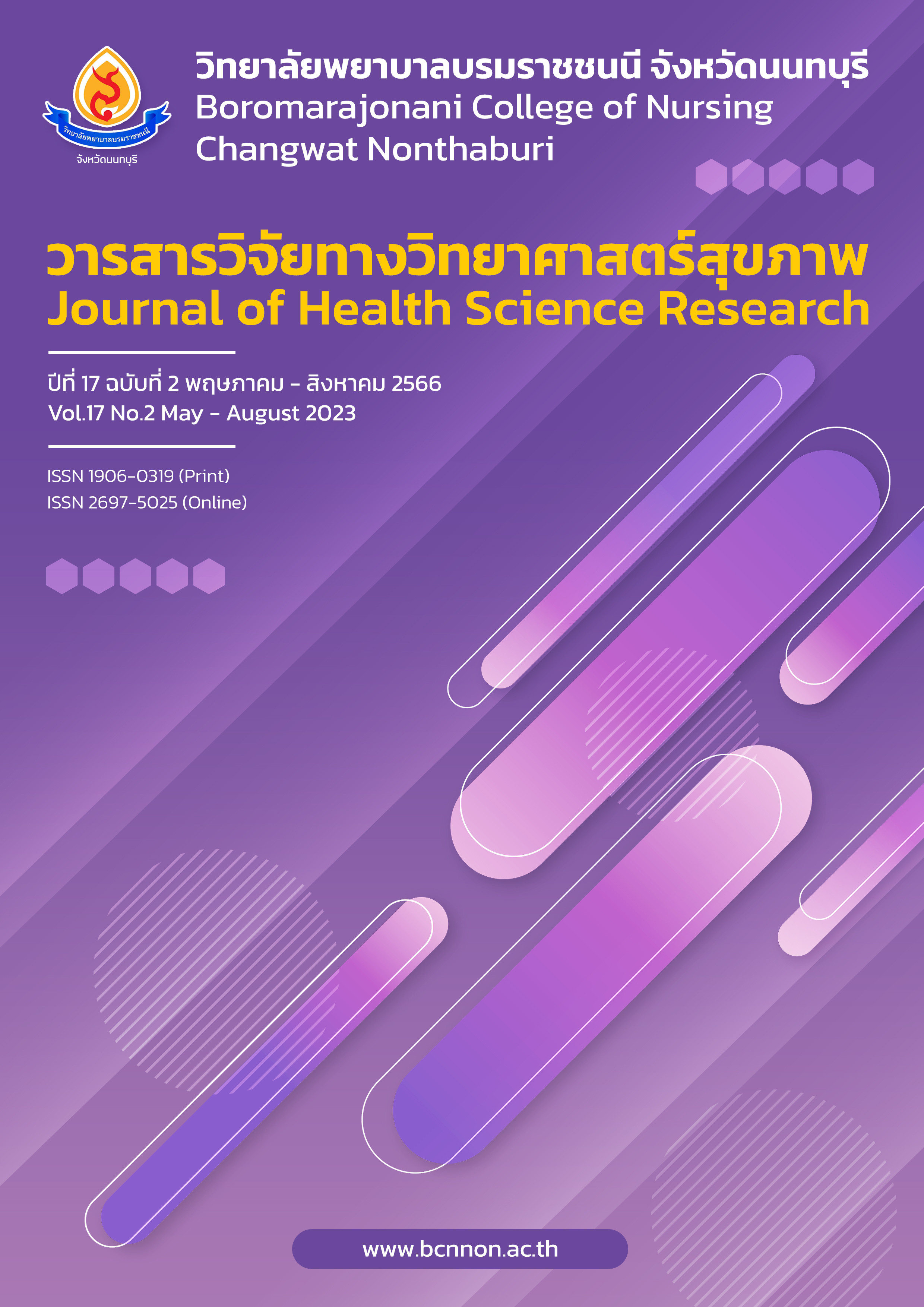ความสัมพันธ์ระหว่างการสนับสนุนทางสังคม ความคิดอัตโนมัติทางลบกับภาวะซึมเศร้าของนักศึกษามหาวิทยาลัยแห่งหนึ่ง
Main Article Content
บทคัดย่อ
บทนำ: ภาวะซึมเศร้าเป็นสาเหตุสำคัญของการนำไปสู่การฆ่าตัวตายในวัยรุ่นและส่งผลให้เกิดปัญหาทางการเรียน ปัญหาครอบครัว ปัญหาสัมพันธภาพในสังคม ซึ่งกระตุ้นให้เกิดความคิดอัตโนมัติทางลบต่อตนเองและอาจส่งผลให้เกิดภาวะซึมเศร้าได้
วัตถุประสงค์การวิจัย: เพื่อหาความสัมพันธ์ระหว่างการสนับสนุนทางสังคม ความคิดอัตโนมัติทางลบกับภาวะซึมเศร้าของนักศึกษาวิทยาลัยสหเวชศาสตร์ มหาวิทยาลัยราชภัฏสวนสุนันทา
วิธีการวิจัย: การวิจัยเชิงพรรณนา กลุ่มตัวอย่างเป็นนักศึกษาวิทยาลัยสหเวชศาสตร์ มหาวิทยาลัยราชภัฏสวนสุนันทา ปีการศึกษา 2565 จำนวน 325 คน เก็บรวบรวมข้อมูลโดยใช้แบบวัดทั้งหมด 4 มีค่าความเที่ยงตรงเท่ากับ 0.85, 0.90 และ 0.96 ตามลำดับ วิเคราะห์ข้อมูลโดยใช้สถิติพรรณนาและทดสอบความสัมพันธ์ด้วยสัมประสิทธิ์สหสัมพันธ์แบบเพียร์สัน
ผลการวิจัย: พบว่า นักศึกวิทยาลัยสหเวชศาสตร์มีการสนับสนุนทางสังคมโดยรวมอยู่ในระดับมากที่สุด (M=3.91, S.D.= 0.86) มีความคิดอัตโนมัติทางลบโดยรวมอยู่ในระดับน้อย (M= 2.34, S.D.= 0.40) และมีภาวะซึมเศร้าระดับน้อย (M=1.66, S.D.= 0.42) ผลการวิเคราะห์ความสัมพันธ์ พบว่า การสนับสนุนทางสังคม ความคิดอัตโนมัติทางลบมีความสัมพันธ์กับภาวะซึมเศร้าของศึกษาวิทยาลัยสหเวชศาสตร์ อย่างมีนัยสำคัญทางสถิติที่ระดับ .01 (r=.542, p<.01 และ r=.373, p<.01 ตามลำดับ)
สรุปผล: พัฒนาทักษะการจัดการความเครียดเพื่อส่งเสริมให้นักศึกษามีการปรับตัวและมีการจัดกิจกรรมให้นักศึกษามีความคิดอัตโนมัติทางลบน้อยลงและมีการสนับสนุนทางสังคมให้มากขึ้นเพื่อป้องกันภาวะซึมเศร้า
Downloads
Article Details

อนุญาตภายใต้เงื่อนไข Creative Commons Attribution-NonCommercial-NoDerivatives 4.0 International License.
บทความที่ได้รับการตีพิมพ์เป็นลิขสิทธิ์ของวิทยาลัยพยาบาลบรมราชชนนี จังหวัดนนทบุรี
ข้อความที่ปรากฏในบทความแต่ละเรื่องในวารสารวิชาการเล่มนี้เป็นความคิดเห็นส่วนตัวของผู้เขียนแต่ละท่านไม่เกี่ยวข้องกับวิทยาลัยพยาบาลบรมราชชนนี จังหวัดนนทบุรี และคณาจารย์ท่านอื่น ในวิทยาลัยฯ แต่อย่างใด ความรับผิดชอบองค์ประกอบทั้งหมดของบทความแต่ละเรื่องเป็นของผู้เขียนแต่ละท่าน หากมีความผิดพลาดใด ๆ ผู้เขียนแต่ละท่านจะรับผิดชอบบทความของตนเองแต่ผู้เดียว
เอกสารอ้างอิง
World Health Organization. Depressive disorder [Internet]. 2022. [cited 2022 May 15] Available from: http://www.who.int/mediacen tre/factsheets/fs369/en/.
Jacobs RH, Reinecke MA, Gollan JK, & Kane P. Empirical evidence of cognitive vulnerability for depression among children and adolescents: a cognitive science and developmental perspective. Clin Psychol Rev. 2008;28(5):759-82.
Song SJ, Ziegler R, Arsenault L, Fried LE, Hacker K. Asian student depression in American high schools: differences in risk factors. J Sch Nurs. 2011;27(6):455-62.
Khunarak U. Factors affecting quality of life in outpatients with depressive disorder at Somdet Chaopraya institute of psychiatry. The Journal of Psychiatric Nursing and Mental Health. 2011; 25(1). 42-54. (in Thai).
Reangsing C. Predictive factors influence depression among secondary school students, regional education office Chiang Rai province. Thai Journal of Nursing Council. 2011;26(2).42-56. (in Thai).
Suttineam K, Suttineam U. Factors influencing depression of students at Rajabhat Baun Somdetchaopraya university. The Journal of psychiatric nursing and Mental Health. 2020; 34(3): 43-61. (in Thai).
Pandii W. Prevalence of depression and its association in late adolescence: a case study in Sisaket technical college. Journal of Public Health. 2015;45(3):298-309. (in Thai).
Graber JA, Sontag LM, Lerner RM, Steinberg L. Handbook of adolescent psychology. Hoboken, NJ: John wiley & Son; 2004.
Vatanasin D, Hengudomsub P, Vatanasin S, Asarath T, Chupan S, Sripim S. Factors predicting depression among health science students. The Journal of Faculty of Nursing Burapha University. 2015;23 (4).31-47. (in Thai).
Makassawad R. Factors Influencing depression among high school student in Pathum Thani Province. Regional Health Promotion Center 9 Journal. 2021;15(38). 528-40. (in Thai).
Townsend MC, Morgan KI. Pocket guide to psychiatric nursing tenth edition. Philadelphia, PA: F.A. Davis; 2018.
Sitthiboonma N. Stress, social support and postpartum depression among first-time mothers [Dissertation]. Chiang Mai: Chiang Mai University; 2020. (in Thai).
Wongvattanaroek P, Ularntinon S, Tangjittiporn T. Negative automatic thoughts associated with depressive symptoms in caregivers of children with attention deficit and hyperactivity disorder at child and adolescent psychiatry clinic, Queen Sirikit national institute of child health. Journal of the Department of Medical Services. 2019;44(3):93-9. (in Thai)
Ritkumrop K. Integrative counseling program on the emotional regulation of undergraduate students with depression [Thesis]. Bangkok: Srinakharinwirot University; 2020. (in Thai)
Yamwong P. A study of social support affect life satisfaction among Thammasat university students [Thesis]. Bangkok: Srinakharinwirot University; 2012. (in Thai).
Beak A, Alford B. Depression: causes and treatment second edition. Philadelphia, PA: University of Pennsylvania Press; 2019.
Rukkhajeekul S. Depression and suicidal behaviors among Naresuan university students. Journal of the Psychiatric Association of Thailand. 2013;58(4):359-70. (in Thai).
Rienpradub S, Rienpradub K, Kuesakul P, Kuesaku K. Study on depression, stress and problem management of freshman in Kingmongkut’s university technology north Bangkok. Journal of Human Sciences. 2020;21(2):103-19. (in Thai).
Kongman K, Hakeem C. Factors affecting mental health problem of nursing students. Journal of The Roral Thai Army Nurse. 2020;21(3):331-9. (in Thai).
Boonprathum P, Hengudomsub P, Vatanasin D. Factors influencing deression among adolescenta in extended opportunity schools. Journal of Public Health Nursing. 2017;31(2).43-58. (in Thai).
Vatanasin D, Chupan S, Hengudomsub P, Vatanasin S, Jantarapakdee. The effect of social problem-solving skill enhancement on depression among nursing students. The Journal of psychiatric nursing and Mental Health. 2020;34(1).86-102. (in Thai).


